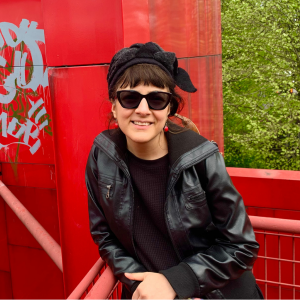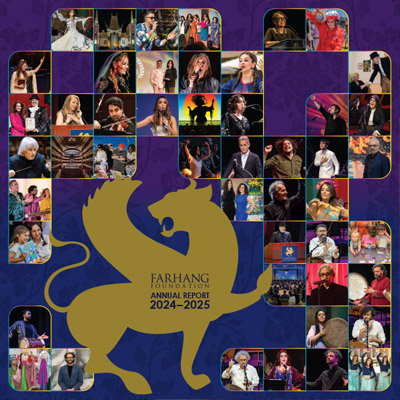Survival By Design: Desert Architecture at the End of the World

Farhang Foundation proudly presents
SURVIVAL BY DESIGN:
Desert Architecture at the End of the World (Lessons from Iran)
A Lecture By Professor Pamela Karimi, Cornell University
A FREE In-Person Event
Part of the USC - Farhang Foundation Iranian Studies Initiative Annual Distinguished Lecture Series
October 15 | 4 PM PST
USC’s Doheny Memorial Library, Lecture Hall DML 240
Centuries of adapting to the harsh desert environments of the Middle East and North Africa (MENA) have led to unique societal and architectural innovations. However, colonial and pseudo-colonial powers often dismissed these sustainable practices as inadequate. With the 20th century's growing reliance on fossil fuels and modern technologies, these eco-friendly methods eroded. During the Oil Crisis and the rise of environmental movements, MENA's desert architecture gained renewed attention. This study examines imaginative architectural and scientific proposals for self-sustained disaster shelters and lunar settlements inspired by MENA's desert designs. It highlights the contrast between the well-funded projects of US experts and the innovative contributions of marginalized figures like Iranian-American architect Nader Khalili, who studied Iran's self-sustaining adobe architecture for refugee and lunar habitats. By exploring various case studies, this lecture challenges the notion that environmental design solutions in the age of accelerated global warming are exclusively the domain of white/Euro-American expertise. It particularly highlights the enduring relevance and ingenuity of traditional desert architecture of Iran.
Parking:
620 USC McCarthy Way, Los Angeles, CA 90089
View parking map
Two Hour Parking $8
Daily Pass: $20
About Professor Pamela Karimi
 Karimi's research lies at the intersection of architecture, art, environmental studies, and socio-political dynamics. This interdisciplinary approach synthesizes insights from ecological, creative, and socio-political spheres. By exploring these intersections, Karimi's work fosters a holistic understanding of how physical spaces, environmental factors, and societal forces interact and shape one another. Supported by a year-long fellowship at the Käte Hamburger Institute at the University of Heidelberg, her current book project, tentatively titled Survival by Design: Desert Architecture at the End of the World, investigates the evolution of architecture and environmental transformations in arid regions from the Cold War era to the present. Her award-winning monograph, Alternative Iran: Contemporary Art and Critical Spatial Practice (Stanford University Press, 2022), provides a nuanced exploration of how Iranian artists, theatre experts, curators, architects, and designers navigate spatial complexities amid restrictive state regulations. Karimi's forthcoming book, supported by the Persian Heritage Foundation and to be published by Leuven/Cornell University Press, offers an insightful analysis of the 2022 Woman, Life, Freedom uprising in Iran. This study uncovers grassroots artistic movements and their crucial role in shaping more democratic public spaces. Currently, Dr. Karimi is collaborating on Cultural History of Asian Art, a comprehensive collection of books offering fresh interpretations of Asian art and architecture over the past 2500 years.
Karimi's research lies at the intersection of architecture, art, environmental studies, and socio-political dynamics. This interdisciplinary approach synthesizes insights from ecological, creative, and socio-political spheres. By exploring these intersections, Karimi's work fosters a holistic understanding of how physical spaces, environmental factors, and societal forces interact and shape one another. Supported by a year-long fellowship at the Käte Hamburger Institute at the University of Heidelberg, her current book project, tentatively titled Survival by Design: Desert Architecture at the End of the World, investigates the evolution of architecture and environmental transformations in arid regions from the Cold War era to the present. Her award-winning monograph, Alternative Iran: Contemporary Art and Critical Spatial Practice (Stanford University Press, 2022), provides a nuanced exploration of how Iranian artists, theatre experts, curators, architects, and designers navigate spatial complexities amid restrictive state regulations. Karimi's forthcoming book, supported by the Persian Heritage Foundation and to be published by Leuven/Cornell University Press, offers an insightful analysis of the 2022 Woman, Life, Freedom uprising in Iran. This study uncovers grassroots artistic movements and their crucial role in shaping more democratic public spaces. Currently, Dr. Karimi is collaborating on Cultural History of Asian Art, a comprehensive collection of books offering fresh interpretations of Asian art and architecture over the past 2500 years.
Dr. Karimi's work transcends Iranian borders, addressing urgent and critical socio-political and environmental issues globally. She coedited The Destruction of Cultural Heritage: From Napoleon to ISIS with Dr. Nasser Rabbat (MIT), tackling urgent concerns in heritage preservation. Her research also encompasses sustainability and design in North America, exemplified by her coedited volume Reinventing the American Post-Industrial City (2014) and her curation of the acclaimed traveling exhibition Black Spaces Matter (2017-2019). Funded by the UMass President's Office Creative Economy Initiatives, this exhibition explored the intersection of race and architecture in 19th-century New Bedford, MA. These accomplishments have attracted attention from major media outlets, including WBUR, Hyperallergic, Al-Jazeera, NPR, The Washington Post, and the BBC.
In addition to her teaching and scholarship, Karimi has held several leadership positions, including the directorship of the Office of Undergraduate Research and the Community Engagement Initiatives at UMass Dartmouth. She has served as Chair of the Aggregate Architectural History Collaborative, board member of the Thresholds Journal (MIT Press), and treasurer of the Association of Modern and Contemporary Art of the Arab World, Iran, and Turkey. Karimi's multifaceted career exemplifies her commitment to bridging academic research with real-world issues, fostering cross-cultural understanding, and nurturing the next generation of scholars and practitioners.
Key Photo Credit: Architect and visionary Nader Khalili during his research odyssey amidst Iran's desert architecture, c. 1977. Courtesy of the Cal Earth Institute.
Help support Farhang Foundation’s free programming!
Event Details
| Event Starts | 10/15/2024 – 4:00 pm |
| Event Ends | 10/15/2024 – 6:00 pm |
| Individual Price | Free Event - Register Now |
| Location | USC's Doheny Memorial Library |







